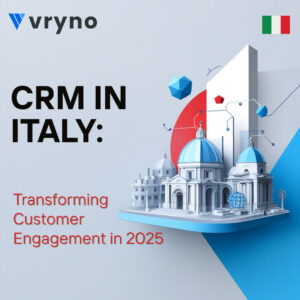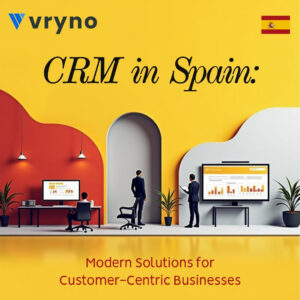What CRM Stands For and Why It Matters?
CRM stands for Customer Relationship Management, but it’s much more than just a tool for managing contacts. A CRM like Vryno CRM is a comprehensive platform that helps businesses manage every aspect of their customer interactions—from initial contact to post-sale support.
At its core, a CRM helps businesses build better relationships with their customers. By storing customer data, tracking interactions, and automating workflows, Vryno CRM provides businesses with a 360-degree view of their customers. This not only helps improve customer service but also drives business growth.
What Can CRM Software Do?
CRM software is designed to do much more than just store customer information. Vryno CRM offers features like sales tracking, lead management, and task automation, all of which help businesses operate more efficiently. By automating repetitive tasks, CRM systems free up time for teams to focus on high-value activities like building customer relationships.
Additionally, Vryno CRM integrates with other business tools, such as email marketing platforms and accounting software. This ensures that all your business processes are connected and working seamlessly together, resulting in improved productivity and better decision-making.
How CRM Works for Businesses?
At its core, CRM software works by centralizing customer data into one platform. Vryno CRM allows teams to access real-time customer information, track interactions, and analyze customer behavior. This not only improves communication but also helps businesses make data-driven decisions.
For example, sales teams can use CRM data to identify trends in customer behavior, enabling them to tailor their approach and close deals faster. Marketing teams can use the same data to create more targeted campaigns, ensuring that their efforts resonate with the right audience.
Where CRM is Used Across Business Functions?
CRM systems are not limited to just one department—they are used across various business functions, including sales, marketing, and customer support. In sales, Vryno CRM helps teams manage leads and track deals through the pipeline. In marketing, the CRM helps track campaign performance and manage customer segments.
In customer support, Vryno CRM helps teams manage inquiries and track service requests. This ensures that customers receive timely and personalized support, leading to higher satisfaction rates. Overall, CRM systems provide the tools necessary to improve efficiency across the entire business.
How CRM Helps in Customer Retention?
One of the most valuable features of CRM software is its ability to improve customer retention. By tracking customer interactions and providing personalized service, Vryno CRM helps businesses nurture long-term relationships. Automated follow-ups and reminders ensure that customers feel valued, even after the sale is made.
For example, Vryno CRM can automatically send reminders for contract renewals or product updates, ensuring that your customers always feel engaged. This level of attention helps businesses build loyalty and increase customer lifetime value.
Why Businesses Use CRM Systems?
Businesses use CRM systems like Vryno CRM to stay organized and improve communication across teams. By centralizing customer data, CRM systems provide businesses with a complete view of their customer base. This allows for more informed decision-making and ensures that teams can collaborate effectively.
Additionally, CRM systems help businesses scale by automating routine tasks. This allows teams to focus on building relationships and driving growth, rather than getting bogged down by administrative work. In short, CRM systems provide the foundation for sustainable business growth.
Conclusion
CRM systems like Vryno CRM are essential tools for any business looking to improve efficiency and drive growth. By centralizing customer data, automating workflows, and providing real-time insights, CRMs help businesses make better decisions and build stronger customer relationships. Whether you’re a small business or a large enterprise, investing in a CRM is an investment in your future success.






